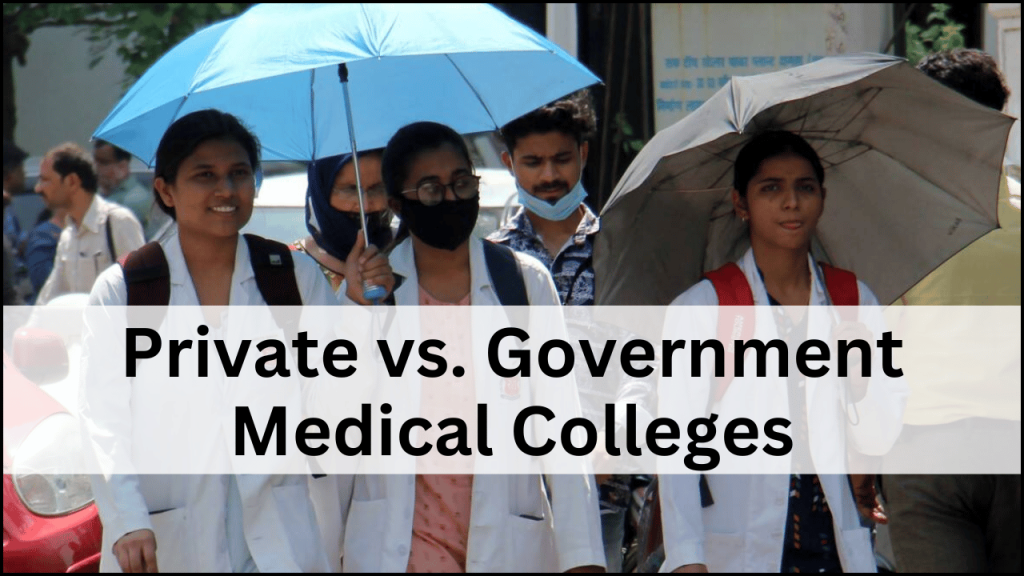Advertisement

Advertisement
Choosing between a private and a government medical college is a big decision for students. Each type has its advantages and disadvantages. Here is a detailed comparison in simple words.
1. Admission Process
- Government Colleges:
- Admission is based on merit and entrance exams like NEET.
- Fewer seats are available compared to the number of applicants.
- The cut-off is usually high due to high competition.
- Private Colleges:
- Admission is based on entrance exams, management quota, and sometimes direct admission.
- More seats are available but at a higher cost.
- Some private colleges have lower cut-off marks than government colleges.
2. Fee Structure
| Feature | Government Colleges | Private Colleges |
|---|---|---|
| Tuition Fees | Low (Affordable) | High (Expensive) |
| Additional Costs | Minimal | High (Donations, Hostel, etc.) |
| Scholarships | Available | Limited |
- Government Colleges:
- Fees are highly subsidized by the government.
- Annual fees can range between INR 10,000 to 1 lakh.
- Private Colleges:
- Fees are much higher, often between INR 10 to 25 lakhs per year.
- Some colleges demand donations or capitation fees.
3. Quality of Education
- Government Colleges:
- Experienced and highly qualified faculty members.
- Extensive exposure to patients due to high patient inflow.
- Research opportunities in reputed institutions.
- Private Colleges:
- Faculty quality varies from college to college.
- Less patient exposure in some institutions.
- Advanced infrastructure and modern facilities in many private institutions.
4. Infrastructure & Facilities
| Feature | Government Colleges | Private Colleges |
| Campus & Buildings | Basic Infrastructure | Modern & Advanced |
| Hostel Facilities | Affordable, Basic | Expensive, Luxurious |
| Library & Labs | Well-equipped | Better Equipment |
| Technology Use | Moderate | High |
- Government Colleges:
- Infrastructure is functional but not always modern.
- Hostel facilities are available but may not be luxurious.
- Private Colleges:
- Better infrastructure, air-conditioned classrooms, and modern laboratories.
- Well-maintained hostels with better amenities.
5. Exposure & Clinical Experience
- Government Colleges:
- Large hospitals attached to colleges provide vast exposure to real cases.
- Opportunity to work with a diverse range of diseases and conditions.
- Private Colleges:
- Clinical exposure depends on the hospital linked with the college.
- Some colleges have good patient flow, while others may have limited cases.
6. Job Opportunities & Career Growth
- Government Colleges:
- Higher preference in government job recruitments.
- Strong alumni networks help in career growth.
- Private Colleges:
- More chances to pursue higher education abroad.
- Some colleges have good placement cells to help with job searches.
7. Competition & Peer Group
- Government Colleges:
- High competition ensures quality students and a competitive environment.
- More opportunities to learn from highly skilled peers.
- Private Colleges:
- Mixed peer group with students from different academic backgrounds.
- Less competition compared to government colleges.
8. Research & Extracurricular Activities
- Government Colleges:
- More opportunities for research and publications.
- Government funding is available for research projects.
- Private Colleges:
- Some colleges promote research, but funding is limited.
- More emphasis on practical skills and foreign collaborations.
9. Return on Investment (ROI)
| Feature | Government Colleges | Private Colleges |
| Initial Investment | Low | High |
| Earning Potential | High | High |
| Loan Requirement | Rarely needed | Often required |
- Government Colleges:
- Low fees but good career prospects.
- Higher salaries in government jobs.
- Private Colleges:
- Expensive education, but if well-reputed, good career opportunities.
- Higher chances of studying abroad or working in private hospitals.
10. Faculty & Teaching Methods
- Government Colleges:
- Highly experienced professors and doctors.
- Focus on theoretical knowledge and practical exposure.
- Private Colleges:
- Faculty varies; some colleges hire top professionals.
- Advanced teaching methods, including online resources.
11. Student Life & Extracurricular Activities
- Government Colleges:
- More freedom and exposure to student organizations.
- Participation in social causes and medical camps.
- Private Colleges:
- More structured environment with strict discipline.
- Focus on academics, but also provide cultural events.
12. Internship & Postgraduate Opportunities
- Government Colleges:
- Internship at government hospitals with hands-on experience.
- Better chances to secure postgraduate (MD/MS) seats.
- Private Colleges:
- Internships may not provide as much real-world experience.
- Limited PG seats compared to government colleges.
End Notes: Which One is Better?
- If affordability, quality education, and patient exposure matter most, then government medical colleges are the best option.
- If budget is not a concern and you want modern infrastructure with personalized attention, private medical colleges can be a good choice.
- Ultimately, both types can produce excellent doctors, and success depends on individual effort and dedication.
Advertisement